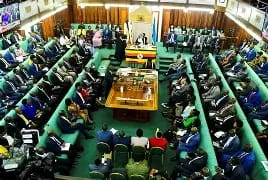
KAMPALA. The Parliament of Uganda is today reconvening and debate five major loan proposals totaling Shs 8.287 trillion (approximately USD 2.1 billion).
The money is urgently needed by government to fund a series of stalled large-scale infrastructure and social development projects across the country.
According to the order paper for the 1st Sitting of the 2nd Meeting of the 5th Session of the 11th Parliament, the Ministry of Finance, Planning and Economic Development will table proposals to borrow from the World Bank’s International Development Association (IDA), Citi Bank, and Standard Chartered Bank to finance critical projects including oil roads, agricultural modernization, and refugee resettlement.
Among the projects to be financed is the design and construction of the Jinja–Mbulamuti–Kamuli–Bukungu Road (127 km) and Jinja City Roads (10 km), through a loan of EUR 230.4 million from Citi Bank.
Another proposal seeks EUR 115.8 million from Standard Chartered Bank to finance the Critical Oil Roads Package 6B, including the Karugutu–Ntoroko Road (56.5 km), Busega –Mpigi Expressway ,Nateete –Nakawuka-Mpigi Road and connections to Rwebisengo and other town roads in Ntoroko District — a key infrastructure component for oil development in the Albertine region.
In addition, Parliament will review a EUR 192.9 million loan from Citi Bank for the first phase of the Enhancing Agricultural Production, Quality and Standards for Market Access Project, and a EUR 342.9 million loan from Standard Chartered Bank for the construction of the Karuma–Tororo double circuit transmission line and associated substations.
The largest facility under consideration is a USD 1.341 billion loan from the World Bank’s IDA, complemented by USD 328.3 million in grants, to support displaced persons and refugee resettlement programs, along with other social and economic development initiatives in Northern Uganda and host communities.
The new borrowing proposals come amid growing debate over Uganda’s public debt sustainability. As of October 2025, government spending had reached alarming levels with the public debt currently standing at Shs106 trillion.
The ministry of finance ’s quarterly debt statistical bulletin released this month in Kampala showed that public debt has over the past year grown by nine percent (by Shs9 trillion). Last year, the public debt stood at $26.56 billion, which was equivalent to Shs96.6 trillion. The ministry attributed this substantial growth in the public debt to increased domestic borrowing in the past year.
The Ministry of Finance has defended its strategy, arguing that most loans are concessional, long-term, and directed toward productive infrastructure expected to generate economic returns that will offset future repayment burdens.
However, the Parliamentary Budget Committee has previously cautioned that project delays, low absorption rates, and weak domestic revenue performance could undermine Uganda’s debt sustainability outlook in the medium term.
The sitting will also receive the Supplementary Expenditure Schedule No. 2 for FY 2025/26, reports from the Auditor General on key national projects and parastatals, including the Uganda National Mining Company, Global Biodiversity Framework, and Uganda Railways Corporation, as well as updates from the Uganda delegation to the African Parliamentary Union held in Rabat, Morocco.